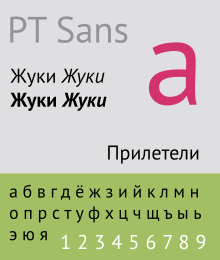PT Fonts
 | |
| Category | Font superfamily |
|---|---|
| Classification |
Humanist sans-serif Transitional serif Monospaced font |
| Designer(s) | Alexandra Korolkova with Olga Umpelova and Vladimir Yefimov |
| Commissioned by | Rospechat |
| Foundry | ParaType |
| Date created | 2009 |
| Date released | 13 January 2010[1] |
| License | SIL Open Font License or ParaType Free Font License |
The Public Type or PT Fonts are a family of free/libre fonts released from 2009 onwards, comprising PT Sans, PT Serif and PT Mono. They were commissioned from the design agency ParaType by Rospechat, a department of the Russian Ministry of Communications, to celebrate the 300th anniversary of Peter the Great's orthography reform and to create a font family that supported all the different variations of Cyrillic script used by the minority languages of Russia, as well as the Latin alphabet.[1][2]
Primarily designed by Alexandra Korolkova, the family includes sans-serif and serif designs, both with caption styles for small-print text, and a monospaced font for use in programming. They are available under the English-language SIL Open Font License; the original font, PT Sans, was also released under ParaType's own Free Font License.[3] Additional styles, such as extended, condensed and extra-bold, are sold from ParaType as PT Sans Pro and PT Serif Pro.[4][5]
Features
.svg.png)
The fonts include Latin and Cyrillic characters and covers almost all minority languages of the Russian Federation. The slashed-Р ruble symbol (before it became official in December 2013) is included at the U+20B9…U+20CF code points.
Regarding classification of design, to Western eyes PT Sans can be considered a humanist sans-serif font, with open letterforms and a true italic featuring calligraphic a and f glyphs. PT Serif can be considered a transitional serif font, with strongly vertical axes but limited variation of stroke width, and insistent, dagger-like serifs on lower-case letters.[7] Its inclusion of optical sizes is extremely rare in libre fonts, EB Garamond being the only other widely used libre font with this feature.
In the most common open-source release, PT Sans and PT Serif feature regular, italic, bold and bold italic designs. They also include a caption style: this is a wider version of the typeface with a greater x-height (taller lower-case letters), designed for legibility at small font sizes and on outdoor signs. PT Sans also includes a condensed version in regular and bold without italics. In caption styles, PT Serif has a caption italic style while PT Sans has a bold version. PT Mono includes regular and bold styles.
Commercial releases include for PT Sans additional light, demi-bold, extra bold and black weights, in regular, narrow, condensed and extra-condensed styles. PT Serif gains an additional 32 styles, with narrow and extended widths, black, extra-bold and demi-bold weights. The professional releases also add text figures and small caps.
Operating system support

PT Sans is included in the Fedora Linux package repository since February 2010,[8] in the Gentoo Linux repository since January 2011,[9] and in OS X since Lion.[10]
Notes
- 1 2 Создан шрифт, поддерживающий все языки народов России (in Russian). Vesti. 2010-01-13. Retrieved 2010-08-04.
- ↑ Разработан новый шрифт с поддержкой всех языков Российской Федерации (in Russian). Rossiyskaya Gazeta. 2010-01-14. Retrieved 2010-08-04.
- ↑ "New version of PT Sans". 2010-04-02. Retrieved 2010-08-04.
- ↑ "PT Sans Pro". MyFonts. Retrieved 21 September 2014.
- ↑ "PT Serif Pro". MyFonts. Retrieved 21 September 2014.
- ↑ "Ruble symbol". 2013-12-11. Retrieved 2013-12-11.
- ↑ Trenholme, Sam. "PT Sans and PT Serif". Retrieved 20 September 2014.
- ↑ "Bug 556308 - Review Request: paratype-pt-sans-fonts - A pan-Cyrillic typeface". Retrieved 2010-08-04.
- ↑ "Gentoo Bug 314503 - media-fonts/pt-sans (new package)". Retrieved 2011-01-19.
- ↑ "OS X Lion default fonts".
External links
| Wikimedia Commons has media related to PT Sans. |
- The font's homepage in English and Russian
- The post in the official ParaType blog announcing PT Sans and telling the story of the project (in Russian)
- Alexandra Korolkova interview